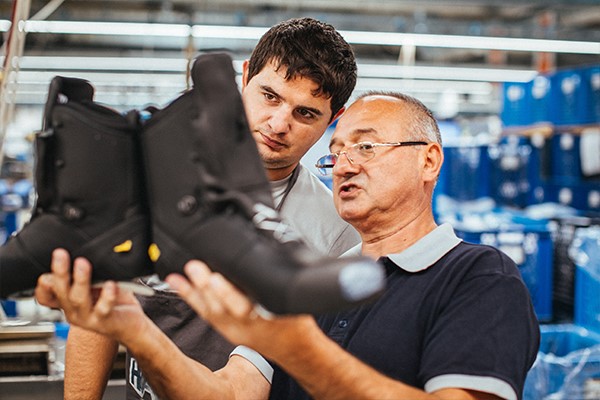Workers may know where their shoes will take them, but do they know where they came from? As the world calls for greater supply chain transparency, it may matter more than ever before.
Supply chain transparency and ethical production are no longer marketing buzzwords but corporate commitments demanding the attention of businesses across a broad spectrum of industries. Consumers, non-governmental organisations, governments and other stakeholders are ramping up the pressure and the consequences of failing to share supply chain related information are mounting.
Tragedies such as the Rana Plaza disaster leading to the Bangladesh Accord, the 2018 Transition Accord and the RMG Sustainability Council, offer a grave reminder that businesses need to know where and how their corporate workwear is sourced, manufactured, transported and stored.
Workwear procurement forms part of a company’s Corporate Social Responsibility strategy as its suppliers’ ethical standards are increasingly considered as part of its own value system. Businesses should ensure that their workwear suppliers use procedures to minimise social and environmental impacts, factory workers are safe, and working conditions are fair and hygienic.
Global footwear manufacturer, HAIX®, made a corporate responsibility promise over seventy years ago focussed on ‘Made in Europe’ manufacturing, which encompasses fair working conditions, sustainable practices and modern testing facilities.
Simon Ash, UK Sales Manager at HAIX®, shares how the family business has stayed true to its promise since its founding in 1948.
What does the Made in Europe label mean?
The ‘Made in Europe’ label was created to demonstrate that a product was manufactured following European regulations, making products safer and less damaging to the environment. However, European regulations can be lax and repeatedly allow for loopholes. For example, if the upper and sole of a shoe are put together in an EU member state, the shoe is allowed to bear the ‘Made in Europe’ label – regardless of whether the two components were originally manufactured in Asia or Africa. HAIX® shoes, however, are 100 per cent manufactured in Europe and adhere to socially responsible guidelines. Looking for the label is one thing, but businesses still need to ask questions, for example, where different product parts are manufactured and put together.
Why would an organisation choose to manufacture every part of a shoe in Europe?
Although European manufacturing is frequently associated with higher costs, HAIX® chooses Europe because regulations protect worker rights and ensure a certain level of environmental and social consideration. For example, leather tanneries in certain parts of the world use toxic chemicals and dyes that place workers at risk of cancer, eczema, blindness and asthma and put the environment at risk of pollution should these harmful substances transfer to water waste. Leather is the most important material in our shoes, so HAIX® only uses certified suppliers that guarantee animal welfare and toxin-free processing.
How can a business ensure its suppliers meet sustainable practices?
Businesses can look for the relevant certificates, for example, HAIX® production sites have been awarded the ISO 14001 environmental certificate. This means HAIX uses high-quality materials to extend the service life of its footwear and save valuable resources through low-pollutant processing, short delivery routes and optimal use of energy such as solar systems and heat recovery.
How does HAIX® ensure its materials are high quality?
HAIX®’s production sites in Mainburg, Germany and Mala Subotica, Croatia are among the world’s most modern shoe production facilities. HAIX® shoes are put through their paces to ensure that they exceed the minimum standards as much as possible, including undergoing a series of over 100 material and quality assurance tests, replicating the day-to-day challenges of wearers, who spend most of their time on their feet. Every year over 300 million pairs of shoes are thrown away by the UK public[1], but using high-quality materials can extend the life of footwear and encourage prolonged use.
How does HAIX® safeguard fair working conditions?
HAIX® believes in equal opportunities, education, and respect. HAIX® offers its employees extensive training and further education programmes. All its production facilities exceed the legal requirements and are certified according to the EN ISO 9001 standard. Additionally, all facilities are socially audited according to the Business Social Compliance Initiative (BSCI), an industry-driven movement that aims to monitor and assess workplace standards across the global supply chain. This ensures workers are protected from common perils of the retail industry from extremely low wages to health problems and insecure work.
What does the future of workwear production look like?
Both suppliers and buyers will need to demonstrate ethical practices to ensure products are being manufactured in a responsible and sustainable way, that the workers involved are treated fairly and safely, and environmental and social impacts have been considered. It will be no longer be a ‘nice to have’ but a necessity as a businesses’ employees, customers and other stakeholders demand action against issues such as climate change, modern slavery and achieving a circular economy. The Made in Europe label may have loopholes, but those who live out its true meaning are and will continue to make a difference to our people and planet. When choosing your footwear, take it seriously, because when the reputation of your supply chain hangs in the balance, it won’t just be factory workers and the environment paying the price.
